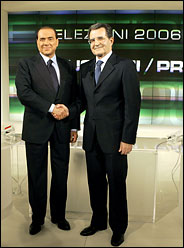mercoledì, marzo 15, 2006
NYT: il primo faccia a faccia

Il new York Times, un commento oggettivo? o gufante? forse un po' gufante.
per me non c'è dubbio che Prodi sia stato il migliore nell'incontro. Lo è anche come uomo politico e, chissà, forse anche come uomo. L'altro non ha seguito i consigli di Veronica ed è andato male...
ROME, March 14 — Many here hoped for the kind of public drama Italy loves, that something decisive might happen on this night Prime Minister Silvio Berlusconi and his challenger Romano Prodi finally faced each other in their first televised debate of this tight race.
Pier Paolo Cito/Associated Press
Prime Minister Silvio Berlusconi, left, and his center-left opponent, Romano Prodi, before the start of their strictly orchestrated televised debate Tuesday. One more debate is scheduled before the April 9-10 election.
But an unwelcome bit of America came to Italy on Tuesday night, in the form of a strictly orchestrated presidential debate. Answers were limited to two-and-a-half minutes. Interruptions were not allowed — and, amazingly, no one did interrupt.
"It's clear this is not a system where you can make a speech in an efficient way," grumbled Mr. Berlusconi, who, behind in the polls, needed to make a bigger impression and seemed to strain harder at the rules.
Mr. Prodi, of course, disagreed, as he did throughout the 90-minute debate, less than a month away from the voting on April 9 and 10.
"This is a system that gives equality," he said. "It is a system that is used by the United States. It is a good system."
That the debate lacked excitement seemed especially odd given that this remains an open race, in which perhaps the least predictable leader in Europe, Mr. Berlusconi, 69, in office for five years, is fighting hard for his political survival and having a tough time of it recently.
He is several points behind in the polls, with economic growth at zero and his brash, personal style of politics far less popular now than when he took office. His center-right coalition continues to erode, prosecutors are again breathing down his neck, and he lost a skirmish with Mr. Prodi on how the debates and television air time would be divvied up.
On Sunday, when he stormed out of a television interview with a particularly persistent left-leaning reporter, his critics said he seemed to be cracking slightly under the pressure.
Compared with that performance, his debating skills on Tuesday seemed back to form. He was relaxed, communing with his usual skill with cameras, as he spilled forth figures on his accomplishments and tried to skewer his center-left opponent.
"The left holds an old ideology, with the same people that never change, that are recycled and that are inherited from an old ideology that views the state as an entity that the citizens must work for," he said in his closing remarks.
But Mr. Prodi, 66, a former prime minister and European Union commissioner, seemed unusually animated and combative, as he worked to dispel his reputation as dull and too much the professor he once was. (Mr. Berlusconi seemed to taunt him slightly by constantly referring to him as "professor.")
"You have had five years of uninterrupted government, and you talk as if you are in the opposition," Mr. Prodi said to Mr. Berlusconi, who had just reeled off a litany of failures of past leftist governments. "What have you done?"
Mr. Berlusconi, despite having admitted that he knew he needed to offer something new to invigorate his campaign, stuck largely to old themes — a fact that Renato Mannheimer, one of Italy's top pollsters, said gave the debate, only narrowly, to Mr. Prodi.
"He also was boring," Mr. Mannheimer said of Mr. Prodi. "But if you compare him to other times, he was a little bit better than in the past, and Berlusconi was the same."
A poll released Tuesday by Mr. Mannheimer showed that 64 percent of Italians had already decided whom to vote for, and both men are chasing after the 24 percent of undecideds, only about 14 percent of whom seemed likely to vote.
But Mr. Berlusconi's old arguments still resonate with many voters: that the coalition of six parties that Mr. Prodi heads is unstable and cynical; that past center-left governments spent a lot and did little; that the left is beholden to the Communists, who are part of their coalition.
"How is he going to get anything done when he will have Communists in his government?" Mr. Berlusconi asked.
Mr. Prodi hit back that Mr. Berlusconi had not lived up to his promises; had governed in a way that benefited him personally; and lacked the "seriousness" to be a suitable leader of one of Europe's leading nations.
Some Italian commentators have complained that the race, for all the serious economic problems Italy faces, has failed to come up with new ideas or new faces. Indeed, the debate on Tuesday had more than a whiff of the past in it: Mr. Berlusconi and Mr. Prodi had debated, if in a more free-wheeling form, in 1996.
Mr. Prodi went on to win the race, but his government was toppled two years later.
Mr. Mannheimer said he expected the undecided voters to make up their minds in the last days of race, making the second and last debate between the two men, on April 3, the decisive one.
"The second match will be more important," he said.
Etichette: elezioni 2006
